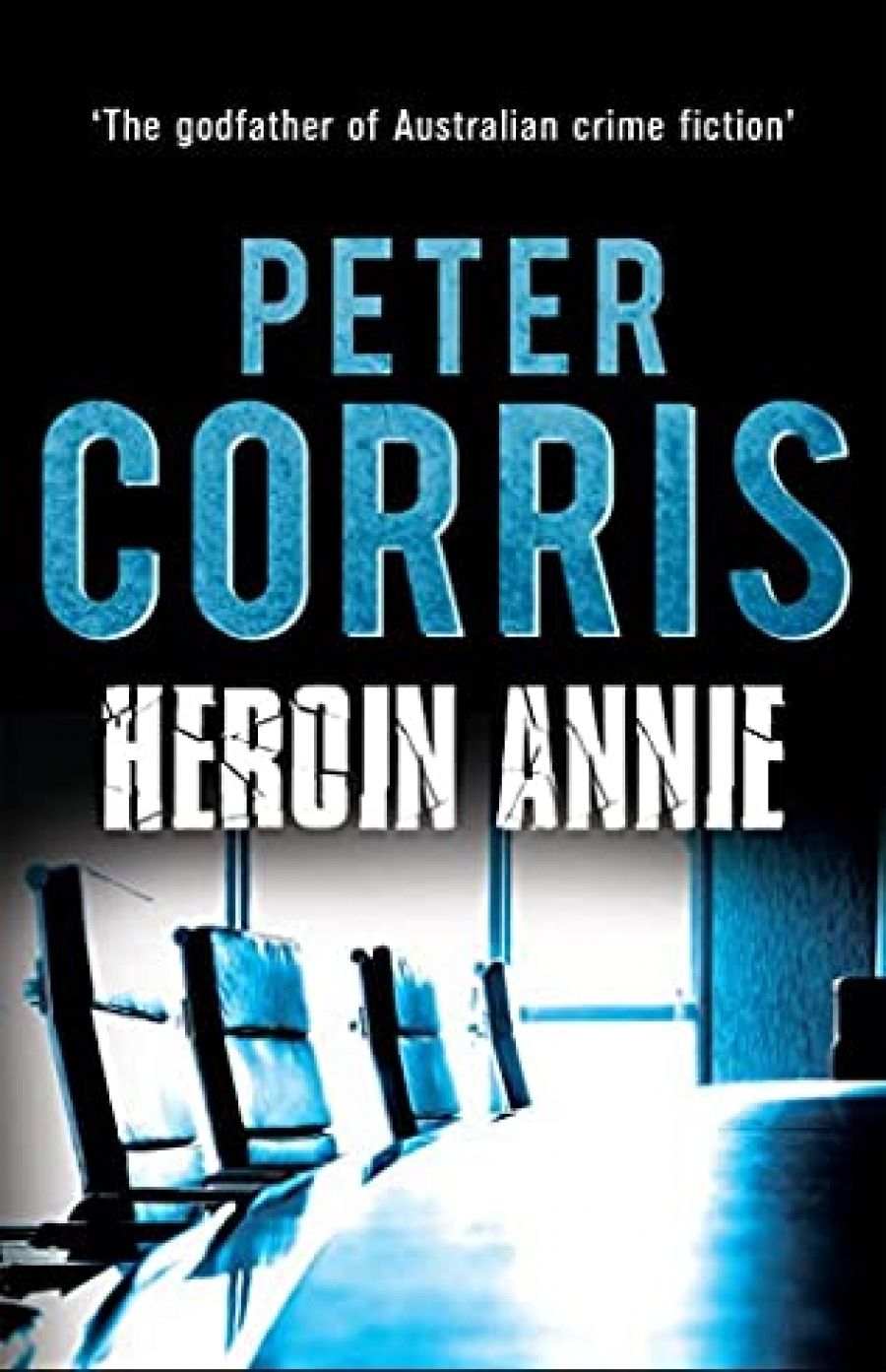
- Free Article: No
- Contents Category: Fiction
- Review Article: Yes
- Online Only: No
- Custom Highlight Text:
This is The Great Tradition. Spade, Marlowe, Archer, Spenser. Peter Corris has relocated it, given it another place and another name and done it all with verve and flair. In ten adventures, Cliff Hardy lurches around Sydney in the rusty armour of his Falcon (except on one occasion when he goes to his spiritual home, California). While Corris does not achieve as much in the short stories as he does in the novels (but then that is true of Hammett), he does present Cliff Hardy as alive (miraculously) and well (apart from batterings and hangovers) and doing good (if not entirely within the meaning of the act).
- Book 1 Title: Heroin Annie
- Book 1 Biblio: Allen & Unwin, $5.95 pb, 266 pp
The first story, ‘Marriages are made in Heaven’, records, laconically and offhandedly, the failure of Cliffs marriage. The Private Eye needs to be a Solitary Man. Cliff breaks a date with his wife Cynthia (i.e. he promises to come home to dinner) to protect the beautiful model – you guessed it – Selina. Cliff rescues Selina from the corrupt, killing clutches of Xavier Carlton.
I had a couple of glasses and got a decent kiss of Selina but it didn’t do me any good. Later I went back to Glebe. Cyn had made a good job of cleaning her stuff out; she’d even taken the bottle of gin.
So now Cliff is free to be the perfect not-so-gentle knight. He is likeable and convincing, though you would hesitate to send your eighteen-year-old daughter to him to investigate those heavy breathing phone calls. Which would be unfair, because he’s not that sort of man, he just talks like it.
These are action stories rather than mystery stories. Mystery is important to the novels, but here the bafflement is rather perfunctory. Nor does Corris have much time for the seedy townscape that he is so good at. But we see Cliff constantly in action – and often quickly out of it. ‘It all took about fifteen seconds: I was going to lunch with a beautiful girl and then I had a bleeding face, dented shoulder and no girl.’ Laconic macho. Private Eyes aren’t made for tears.
I went up the first flight, made a turn and then something like the Queen Mary hit me behind the ear. My face hit the carpet hard and a front end loader scooped me up and threw me down the stairs.
A sporting writer for The Private Eye Reporter would have weekly copy on the state of Cliff’s face. ‘The sound inside my skull was like a rocket being launched ...’, ‘I felt the skin open and I went down …’ You hope that Cliff has filled in his Medicare form until you realise that his healing is an aspirin and a slug of whisky. Long live knights in rusty Falcons and damsels in distress. Corris does this very well, though it doesn’t bear thinking about for too long. Or at all.
Hardy is affectionately familiar about guns in a way that we thought was only the fashion over there. ‘I took the Smith & Wesson .38 out from under the dashboard, checked it over, and walked back.’ ‘Before I left the car I made a show of putting the big Colt into the clip under the dashboard.’ ‘Back in the living room I put my .38 handy and unloaded the .45.’ It makes new car buyers want to look carefully under the dash when they are being cajoled by the virtues of the ‘optional extras’. Corris does import, duty-free, a world of nonchalant violence and makes us ask if we haven’t been living and dying with it all our lives.
Cliff Hardy is the hardbitten man who is a soft touch. There is the traditional element, the almost compulsory element of sentimentality in this account. ‘I drank some more and selfpity ran strong and I thought sourly about Selina and Short and trust and love.’ Generally, Hardy is less given to moral introspection than Philip Marlowe or Lew Archer. However, he does fight for some sort of moral order, has little respect for top dogs and fat cats, and fights hard for the underdog. These stories differ from many of their American counterparts in that some of Hardy’s clients don’t belong to the Pekingese, Mink, and Mercedes class.
Corris writes well, transposing the Chandler-Hammett genre without making a parody of it. ‘Suddenly she lost interest in her beer; there was a rough, flaky patch of skin near her nose, and she scratched it.’ As narrator, Hardy notices life’s less attractive little details. He cannot resist a simile any more than he can resist being attracted to a beautiful woman: ‘She slid into the back seat of the car like a cat going into its basket; as she snaked her spike-shoed foot in I realised that I had been holding my breath.’
These stories are full of violence: ‘Then Riley bent smoothly, picked up the carbine and fired a short burst. Clem’s head flew apart and he pitched backwards still holding the .303.’ Men die still holding their .303s or their .38s or their .45s. It’s male and macho. But then Hardy could well have just come from any number of Royal Commissions, as he returns to his seedy office or his lonely home, shoves his .38 in the drawer, pours himself a slug, and gets on the phone to an honest cop who grudgingly owes him a favour.


Comments powered by CComment